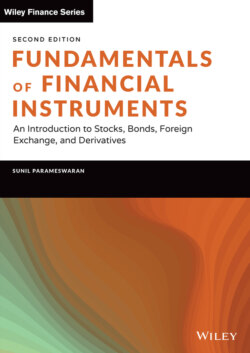Читать книгу Fundamentals of Financial Instruments - Sunil K. Parameswaran - Страница 46
На сайте Литреса книга снята с продажи.
INVESTMENT BANKERS
ОглавлениеAn investment banker is an investment professional who facilitates the issuance of securities in the primary market. These institutions help the issue process in two ways. First, they help the borrower to comply with various legal and procedural requirements that are usually mandatory for such issues. For instance, a prospectus or an offer document must accompany any solicitation efforts for the issue. Most issues have to be registered with the capital markets regulator of the country, which is the Securities and Exchange Commission (SEC) in the United States. Finally, most issues are listed on at least one stock exchange. Listing is a process by which an exchange formally admits the issue for trading between investors, after the securities have been allotted. An IT firm or an automobile manufacturer will be clueless about the latest regulations and procedures. Hence, they require professional advice to facilitate a successful issue of securities, and this is where investment banks can help.
Second, investment bankers provide insurance to the issuer by underwriting the issue. This means that they stand ready to buy that portion of the issue which remains unsubscribed, if the issue were to be undersubscribed. Underwriting helps in two ways. First, it reduces the risk for the issuer. Second, it sends a positive signal to the potential investors about the quality of the issue, since the investment banker stands ready to buy whatever they choose not to subscribe to. To give an example, consider an issue that has been underwritten by UBS. This means that if investors do not subscribe to the entire amount on offer, UBS will accept the remainder. This would reassure a potential investor, for obviously a bank like UBS would not give such an undertaking without doing its homework. In certain cases, an investment bank may not desire to take upon itself the entire risk of a new security issue, for the issue may be very large, or else may be perceived to be extra risky. Consequently, a group of investment banks may underwrite the issue together, thereby spreading the risk. This is called syndicated underwriting. The chief underwriter is referred to as the lead manager. The next rung of investment bankers are referred to as co-managers. There is also a selling group associated with most issues. It consists of relatively smaller investment banks, who do not underwrite the issue, but who have been roped in because of their expertise in marketing such issues in their zones of influence.
At times the investment bank, instead of underwriting the issue, will offer to sell it on a best efforts basis. That is, the bank will merely offer to do its level best to ensure that the issue is fully subscribed. In these cases, the investment bank merely performs a marketing function without providing the insurance that characterizes the process of underwriting. Consequently, the bank's commission in such cases will be lower.
Most public offerings are usually underwritten because issuers are more comfortable with such arrangements. This is because the investment bank has a greater incentive to sell the securities when there is a risk of devolvement. What is devolvement risk? It is the risk that the bank may have to buy the unsold securities in the event of undersubscription. Such an eventuality will inevitably lead to a loss for the bank, in the sense that the shares so acquired will have to be subsequently offloaded in the market at a price that is lower than the issue price. This is because devolvement is a clear sign of negative market sentiments about the issue, and an issue that fails will experience a fall in price on listing.
